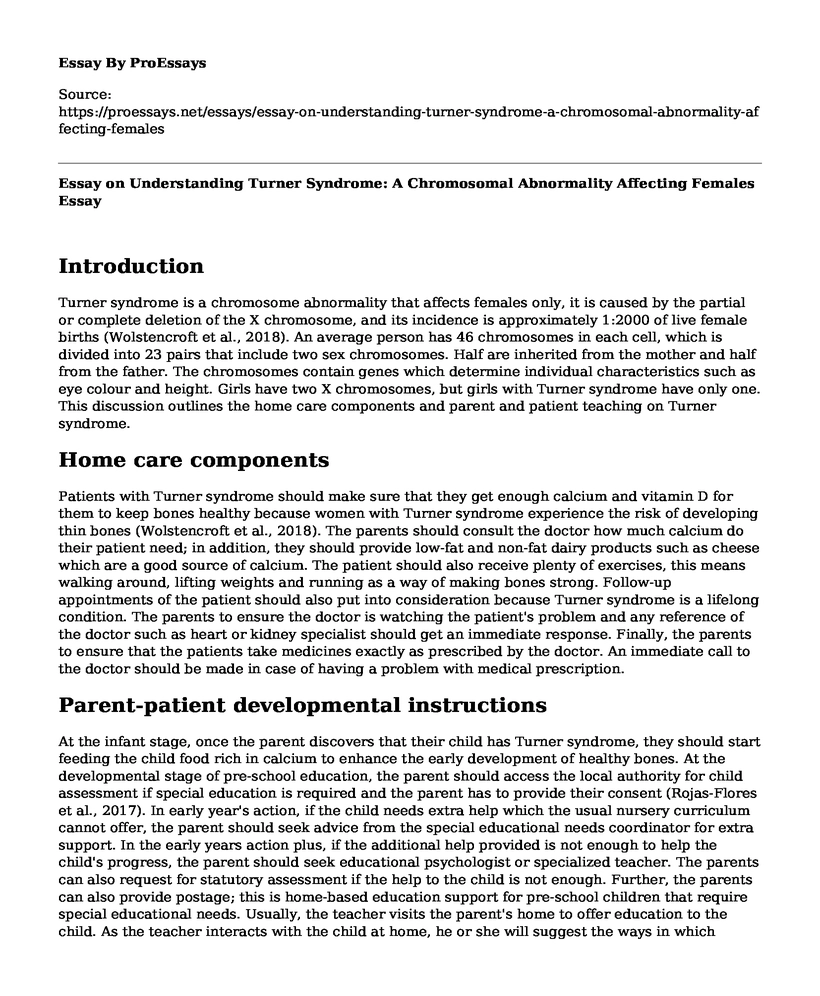Introduction
Turner syndrome is a chromosome abnormality that affects females only, it is caused by the partial or complete deletion of the X chromosome, and its incidence is approximately 1:2000 of live female births (Wolstencroft et al., 2018). An average person has 46 chromosomes in each cell, which is divided into 23 pairs that include two sex chromosomes. Half are inherited from the mother and half from the father. The chromosomes contain genes which determine individual characteristics such as eye colour and height. Girls have two X chromosomes, but girls with Turner syndrome have only one. This discussion outlines the home care components and parent and patient teaching on Turner syndrome.
Home care components
Patients with Turner syndrome should make sure that they get enough calcium and vitamin D for them to keep bones healthy because women with Turner syndrome experience the risk of developing thin bones (Wolstencroft et al., 2018). The parents should consult the doctor how much calcium do their patient need; in addition, they should provide low-fat and non-fat dairy products such as cheese which are a good source of calcium. The patient should also receive plenty of exercises, this means walking around, lifting weights and running as a way of making bones strong. Follow-up appointments of the patient should also put into consideration because Turner syndrome is a lifelong condition. The parents to ensure the doctor is watching the patient's problem and any reference of the doctor such as heart or kidney specialist should get an immediate response. Finally, the parents to ensure that the patients take medicines exactly as prescribed by the doctor. An immediate call to the doctor should be made in case of having a problem with medical prescription.
Parent-patient developmental instructions
At the infant stage, once the parent discovers that their child has Turner syndrome, they should start feeding the child food rich in calcium to enhance the early development of healthy bones. At the developmental stage of pre-school education, the parent should access the local authority for child assessment if special education is required and the parent has to provide their consent (Rojas-Flores et al., 2017). In early year's action, if the child needs extra help which the usual nursery curriculum cannot offer, the parent should seek advice from the special educational needs coordinator for extra support. In the early years action plus, if the additional help provided is not enough to help the child's progress, the parent should seek educational psychologist or specialized teacher. The parents can also request for statutory assessment if the help to the child is not enough. Further, the parents can also provide postage; this is home-based education support for pre-school children that require special educational needs. Usually, the teacher visits the parent's home to offer education to the child. As the teacher interacts with the child at home, he or she will suggest the ways in which parents will use to provide essential help to the child and also make a note on specific areas of difficult on how to handle them. Lastly, parents should give toy and leisure libraries for play sessions where the parent and child can chat with each other in order to provide many opportunities for social interactions with the child.
Conclusion
To sum up, the parent should take time to help her daughter to plan her day, five lots of praise and encouragement even if repeatedly ask you the same thing; this is because they will be seeking reassurance that what they think might happen. When asking the child to get something for you, mention the name and the colour because it will help them to be sure that they are getting things correct.
References
Rojas-Flores, L., Clements, M. L., Hwang Koo, J., & London, J. (2017). Trauma and psychological distress in Latino citizen children following parental detention and deportation. Psychological Trauma: Theory, Research, Practice, and Policy, 9(3), 352.
Turner Syndrome in Children: Care Instructions. (n.d.). https://myhealth.alberta.ca/Health/aftercareinformation/pages/conditions.aspx?hwid=ug5420
Wolstencroft, J., Mandy, W., & Skuse, D. (2018). Protocol: New approaches to managing the social deficits of Turner Syndrome using the PEERS program. F1000Research, 7.
Cite this page
Essay on Understanding Turner Syndrome: A Chromosomal Abnormality Affecting Females. (2023, May 03). Retrieved from https://proessays.net/essays/essay-on-understanding-turner-syndrome-a-chromosomal-abnormality-affecting-females
If you are the original author of this essay and no longer wish to have it published on the ProEssays website, please click below to request its removal:
- Stance Essay Example: Media and Young Minds
- Unlock Creativity, Leadership and Innovation - Paper Example
- Essay Example on Development: Constancy & Change Across Life
- Essay Example on Family Dynamics: Love, Loyalty, Disappointments & Beyond
- Essay Example on Promoting Healthy Weights: Parent & School Interventions
- Paper Example on Rival Causes: Establishing Causal Claim Evidence
- Reflections on Teaching Mathematics: Planning, Assessment, and Continuous Improvement - Essay Sample







